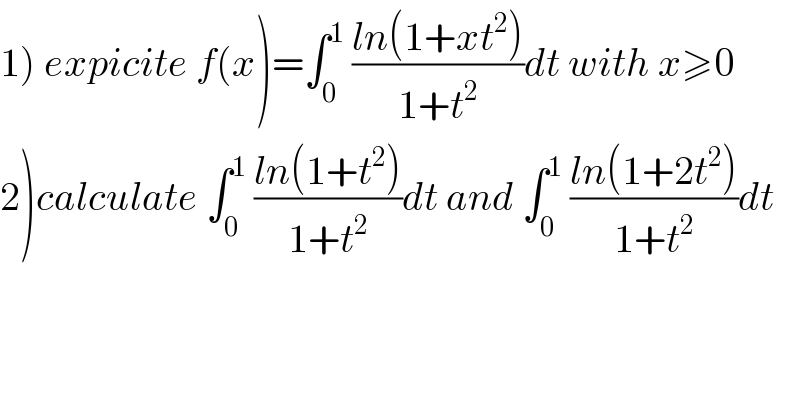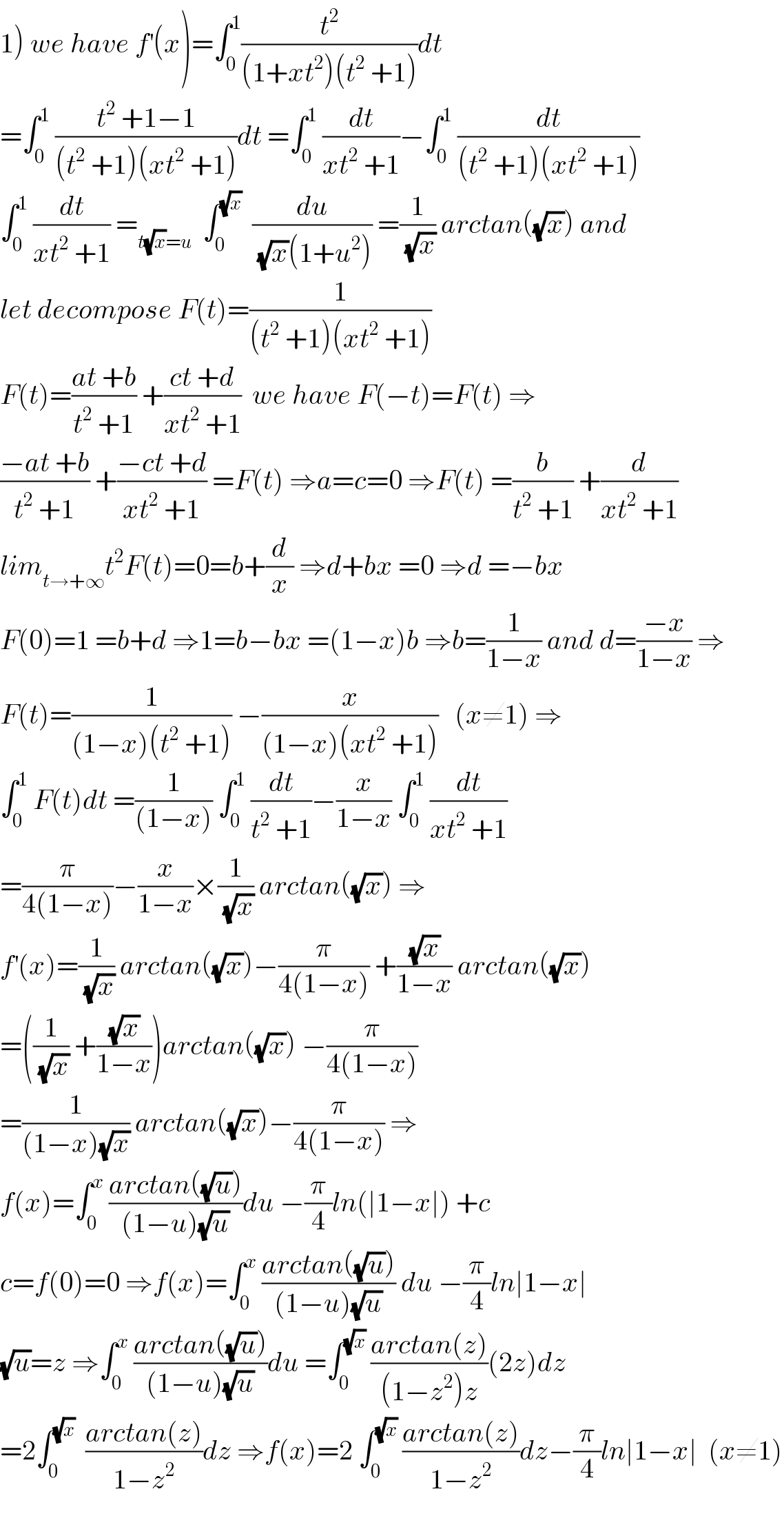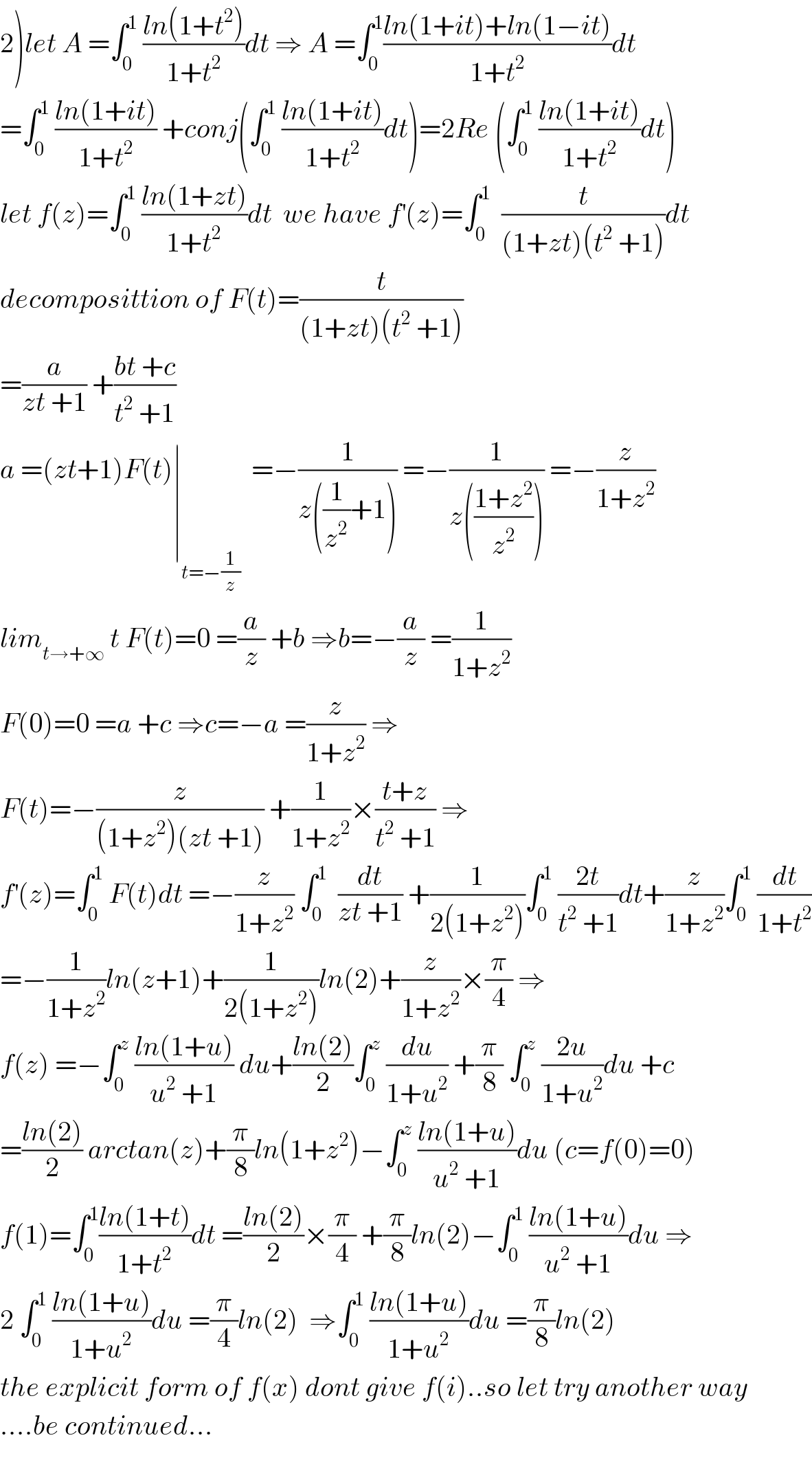Question Number 79627 by mathmax by abdo last updated on 26/Jan/20

$$\left.\mathrm{1}\right)\:{expicite}\:{f}\left({x}\right)=\int_{\mathrm{0}} ^{\mathrm{1}} \:\frac{{ln}\left(\mathrm{1}+{xt}^{\mathrm{2}} \right)}{\mathrm{1}+{t}^{\mathrm{2}} }{dt}\:{with}\:{x}\geqslant\mathrm{0} \\ $$$$\left.\mathrm{2}\right){calculate}\:\int_{\mathrm{0}} ^{\mathrm{1}} \:\frac{{ln}\left(\mathrm{1}+{t}^{\mathrm{2}} \right)}{\mathrm{1}+{t}^{\mathrm{2}} }{dt}\:{and}\:\int_{\mathrm{0}} ^{\mathrm{1}} \:\frac{{ln}\left(\mathrm{1}+\mathrm{2}{t}^{\mathrm{2}} \right)}{\mathrm{1}+{t}^{\mathrm{2}} }{dt} \\ $$
Commented by mathmax by abdo last updated on 30/Jan/20

$$\left.\mathrm{1}\right)\:{we}\:{have}\:{f}^{'} \left({x}\right)=\int_{\mathrm{0}} ^{\mathrm{1}} \frac{{t}^{\mathrm{2}} }{\left(\mathrm{1}+{xt}^{\mathrm{2}} \right)\left({t}^{\mathrm{2}} \:+\mathrm{1}\right)}{dt} \\ $$$$=\int_{\mathrm{0}} ^{\mathrm{1}} \:\frac{{t}^{\mathrm{2}} \:+\mathrm{1}−\mathrm{1}}{\left({t}^{\mathrm{2}} \:+\mathrm{1}\right)\left({xt}^{\mathrm{2}} \:+\mathrm{1}\right)}{dt}\:=\int_{\mathrm{0}} ^{\mathrm{1}} \:\frac{{dt}}{{xt}^{\mathrm{2}} \:+\mathrm{1}}−\int_{\mathrm{0}} ^{\mathrm{1}} \:\frac{{dt}}{\left({t}^{\mathrm{2}} \:+\mathrm{1}\right)\left({xt}^{\mathrm{2}} \:+\mathrm{1}\right)} \\ $$$$\int_{\mathrm{0}} ^{\mathrm{1}} \:\frac{{dt}}{{xt}^{\mathrm{2}} \:+\mathrm{1}}\:=_{{t}\sqrt{{x}}={u}} \:\:\int_{\mathrm{0}} ^{\sqrt{{x}}} \:\:\frac{{du}}{\:\sqrt{{x}}\left(\mathrm{1}+{u}^{\mathrm{2}} \right)}\:=\frac{\mathrm{1}}{\:\sqrt{{x}}}\:{arctan}\left(\sqrt{{x}}\right)\:{and} \\ $$$${let}\:{decompose}\:{F}\left({t}\right)=\frac{\mathrm{1}}{\left({t}^{\mathrm{2}} \:+\mathrm{1}\right)\left({xt}^{\mathrm{2}} \:+\mathrm{1}\right)} \\ $$$${F}\left({t}\right)=\frac{{at}\:+{b}}{{t}^{\mathrm{2}} \:+\mathrm{1}}\:+\frac{{ct}\:+{d}}{{xt}^{\mathrm{2}} \:+\mathrm{1}}\:\:{we}\:{have}\:{F}\left(−{t}\right)={F}\left({t}\right)\:\Rightarrow \\ $$$$\frac{−{at}\:+{b}}{{t}^{\mathrm{2}} \:+\mathrm{1}}\:+\frac{−{ct}\:+{d}}{{xt}^{\mathrm{2}} \:+\mathrm{1}}\:={F}\left({t}\right)\:\Rightarrow{a}={c}=\mathrm{0}\:\Rightarrow{F}\left({t}\right)\:=\frac{{b}}{{t}^{\mathrm{2}} \:+\mathrm{1}}\:+\frac{{d}}{{xt}^{\mathrm{2}} \:+\mathrm{1}} \\ $$$${lim}_{{t}\rightarrow+\infty} {t}^{\mathrm{2}} {F}\left({t}\right)=\mathrm{0}={b}+\frac{{d}}{{x}}\:\Rightarrow{d}+{bx}\:=\mathrm{0}\:\Rightarrow{d}\:=−{bx} \\ $$$${F}\left(\mathrm{0}\right)=\mathrm{1}\:={b}+{d}\:\Rightarrow\mathrm{1}={b}−{bx}\:=\left(\mathrm{1}−{x}\right){b}\:\Rightarrow{b}=\frac{\mathrm{1}}{\mathrm{1}−{x}}\:{and}\:{d}=\frac{−{x}}{\mathrm{1}−{x}}\:\Rightarrow \\ $$$${F}\left({t}\right)=\frac{\mathrm{1}}{\left(\mathrm{1}−{x}\right)\left({t}^{\mathrm{2}} \:+\mathrm{1}\right)}\:−\frac{{x}}{\left(\mathrm{1}−{x}\right)\left({xt}^{\mathrm{2}} \:+\mathrm{1}\right)}\:\:\:\left({x}\neq\mathrm{1}\right)\:\Rightarrow \\ $$$$\int_{\mathrm{0}} ^{\mathrm{1}} \:{F}\left({t}\right){dt}\:=\frac{\mathrm{1}}{\left(\mathrm{1}−{x}\right)}\:\int_{\mathrm{0}} ^{\mathrm{1}} \:\frac{{dt}}{{t}^{\mathrm{2}} \:+\mathrm{1}}−\frac{{x}}{\mathrm{1}−{x}}\:\int_{\mathrm{0}} ^{\mathrm{1}} \:\frac{{dt}}{{xt}^{\mathrm{2}} \:+\mathrm{1}} \\ $$$$=\frac{\pi}{\mathrm{4}\left(\mathrm{1}−{x}\right)}−\frac{{x}}{\mathrm{1}−{x}}×\frac{\mathrm{1}}{\:\sqrt{{x}}}\:{arctan}\left(\sqrt{{x}}\right)\:\Rightarrow \\ $$$${f}^{'} \left({x}\right)=\frac{\mathrm{1}}{\:\sqrt{{x}}}\:{arctan}\left(\sqrt{{x}}\right)−\frac{\pi}{\mathrm{4}\left(\mathrm{1}−{x}\right)}\:+\frac{\sqrt{{x}}}{\mathrm{1}−{x}}\:{arctan}\left(\sqrt{{x}}\right) \\ $$$$=\left(\frac{\mathrm{1}}{\:\sqrt{{x}}}\:+\frac{\sqrt{{x}}}{\mathrm{1}−{x}}\right){arctan}\left(\sqrt{{x}}\right)\:−\frac{\pi}{\mathrm{4}\left(\mathrm{1}−{x}\right)} \\ $$$$=\frac{\mathrm{1}}{\left(\mathrm{1}−{x}\right)\sqrt{{x}}}\:{arctan}\left(\sqrt{{x}}\right)−\frac{\pi}{\mathrm{4}\left(\mathrm{1}−{x}\right)}\:\Rightarrow \\ $$$${f}\left({x}\right)=\int_{\mathrm{0}} ^{{x}} \:\frac{{arctan}\left(\sqrt{{u}}\right)}{\left(\mathrm{1}−{u}\right)\sqrt{{u}}}{du}\:−\frac{\pi}{\mathrm{4}}{ln}\left(\mid\mathrm{1}−{x}\mid\right)\:+{c} \\ $$$${c}={f}\left(\mathrm{0}\right)=\mathrm{0}\:\Rightarrow{f}\left({x}\right)=\int_{\mathrm{0}} ^{{x}} \:\frac{{arctan}\left(\sqrt{{u}}\right)}{\left(\mathrm{1}−{u}\right)\sqrt{{u}}}\:{du}\:−\frac{\pi}{\mathrm{4}}{ln}\mid\mathrm{1}−{x}\mid \\ $$$$\sqrt{{u}}={z}\:\Rightarrow\int_{\mathrm{0}} ^{{x}} \:\frac{{arctan}\left(\sqrt{{u}}\right)}{\left(\mathrm{1}−{u}\right)\sqrt{{u}}}{du}\:=\int_{\mathrm{0}} ^{\sqrt{{x}}} \:\frac{{arctan}\left({z}\right)}{\left(\mathrm{1}−{z}^{\mathrm{2}} \right){z}}\left(\mathrm{2}{z}\right){dz} \\ $$$$=\mathrm{2}\int_{\mathrm{0}} ^{\sqrt{{x}}} \:\:\frac{{arctan}\left({z}\right)}{\mathrm{1}−{z}^{\mathrm{2}} }{dz}\:\Rightarrow{f}\left({x}\right)=\mathrm{2}\:\int_{\mathrm{0}} ^{\sqrt{{x}}} \:\frac{{arctan}\left({z}\right)}{\mathrm{1}−{z}^{\mathrm{2}} }{dz}−\frac{\pi}{\mathrm{4}}{ln}\mid\mathrm{1}−{x}\mid\:\:\left({x}\neq\mathrm{1}\right) \\ $$$$ \\ $$
Commented by mathmax by abdo last updated on 30/Jan/20

$$\left.\mathrm{2}\right){let}\:{A}\:=\int_{\mathrm{0}} ^{\mathrm{1}} \:\frac{{ln}\left(\mathrm{1}+{t}^{\mathrm{2}} \right)}{\mathrm{1}+{t}^{\mathrm{2}} }{dt}\:\Rightarrow\:{A}\:=\int_{\mathrm{0}} ^{\mathrm{1}} \frac{{ln}\left(\mathrm{1}+{it}\right)+{ln}\left(\mathrm{1}−{it}\right)}{\mathrm{1}+{t}^{\mathrm{2}} }{dt} \\ $$$$=\int_{\mathrm{0}} ^{\mathrm{1}} \:\frac{{ln}\left(\mathrm{1}+{it}\right)}{\mathrm{1}+{t}^{\mathrm{2}} }\:+{conj}\left(\int_{\mathrm{0}} ^{\mathrm{1}} \:\frac{{ln}\left(\mathrm{1}+{it}\right)}{\mathrm{1}+{t}^{\mathrm{2}} }{dt}\right)=\mathrm{2}{Re}\:\left(\int_{\mathrm{0}} ^{\mathrm{1}} \:\frac{{ln}\left(\mathrm{1}+{it}\right)}{\mathrm{1}+{t}^{\mathrm{2}} }{dt}\right) \\ $$$${let}\:{f}\left({z}\right)=\int_{\mathrm{0}} ^{\mathrm{1}} \:\frac{{ln}\left(\mathrm{1}+{zt}\right)}{\mathrm{1}+{t}^{\mathrm{2}} }{dt}\:\:{we}\:{have}\:{f}^{'} \left({z}\right)=\int_{\mathrm{0}} ^{\mathrm{1}} \:\:\frac{{t}}{\left(\mathrm{1}+{zt}\right)\left({t}^{\mathrm{2}} \:+\mathrm{1}\right)}{dt} \\ $$$${decomposittion}\:{of}\:{F}\left({t}\right)=\frac{{t}}{\left(\mathrm{1}+{zt}\right)\left({t}^{\mathrm{2}} \:+\mathrm{1}\right)} \\ $$$$=\frac{{a}}{{zt}\:+\mathrm{1}}\:+\frac{{bt}\:+{c}}{{t}^{\mathrm{2}} \:+\mathrm{1}} \\ $$$${a}\:=\left({zt}+\mathrm{1}\right){F}\left({t}\right)\mid_{{t}=−\frac{\mathrm{1}}{{z}}} \:\:=−\frac{\mathrm{1}}{{z}\left(\frac{\mathrm{1}}{{z}^{\mathrm{2}} }+\mathrm{1}\right)}\:=−\frac{\mathrm{1}}{{z}\left(\frac{\mathrm{1}+{z}^{\mathrm{2}} }{{z}^{\mathrm{2}} }\right)}\:=−\frac{{z}}{\mathrm{1}+{z}^{\mathrm{2}} } \\ $$$${lim}_{{t}\rightarrow+\infty} \:{t}\:{F}\left({t}\right)=\mathrm{0}\:=\frac{{a}}{{z}}\:+{b}\:\Rightarrow{b}=−\frac{{a}}{{z}}\:=\frac{\mathrm{1}}{\mathrm{1}+{z}^{\mathrm{2}} } \\ $$$${F}\left(\mathrm{0}\right)=\mathrm{0}\:={a}\:+{c}\:\Rightarrow{c}=−{a}\:=\frac{{z}}{\mathrm{1}+{z}^{\mathrm{2}} }\:\Rightarrow \\ $$$${F}\left({t}\right)=−\frac{{z}}{\left(\mathrm{1}+{z}^{\mathrm{2}} \right)\left({zt}\:+\mathrm{1}\right)}\:+\frac{\mathrm{1}}{\mathrm{1}+{z}^{\mathrm{2}} }×\frac{{t}+{z}}{{t}^{\mathrm{2}} \:+\mathrm{1}}\:\Rightarrow \\ $$$${f}^{'} \left({z}\right)=\int_{\mathrm{0}} ^{\mathrm{1}} \:{F}\left({t}\right){dt}\:=−\frac{{z}}{\mathrm{1}+{z}^{\mathrm{2}} }\:\int_{\mathrm{0}} ^{\mathrm{1}} \:\:\frac{{dt}}{{zt}\:+\mathrm{1}}\:+\frac{\mathrm{1}}{\mathrm{2}\left(\mathrm{1}+{z}^{\mathrm{2}} \right)}\int_{\mathrm{0}} ^{\mathrm{1}} \:\frac{\mathrm{2}{t}}{{t}^{\mathrm{2}} \:+\mathrm{1}}{dt}+\frac{{z}}{\mathrm{1}+{z}^{\mathrm{2}} }\int_{\mathrm{0}} ^{\mathrm{1}} \:\frac{{dt}}{\mathrm{1}+{t}^{\mathrm{2}} } \\ $$$$=−\frac{\mathrm{1}}{\mathrm{1}+{z}^{\mathrm{2}} }{ln}\left({z}+\mathrm{1}\right)+\frac{\mathrm{1}}{\mathrm{2}\left(\mathrm{1}+{z}^{\mathrm{2}} \right)}{ln}\left(\mathrm{2}\right)+\frac{{z}}{\mathrm{1}+{z}^{\mathrm{2}} }×\frac{\pi}{\mathrm{4}}\:\Rightarrow \\ $$$${f}\left({z}\right)\:=−\int_{\mathrm{0}} ^{{z}} \:\frac{{ln}\left(\mathrm{1}+{u}\right)}{{u}^{\mathrm{2}} \:+\mathrm{1}}\:{du}+\frac{{ln}\left(\mathrm{2}\right)}{\mathrm{2}}\int_{\mathrm{0}} ^{{z}} \:\frac{{du}}{\mathrm{1}+{u}^{\mathrm{2}} }\:+\frac{\pi}{\mathrm{8}}\:\int_{\mathrm{0}} ^{{z}} \:\frac{\mathrm{2}{u}}{\mathrm{1}+{u}^{\mathrm{2}} }{du}\:+{c} \\ $$$$=\frac{{ln}\left(\mathrm{2}\right)}{\mathrm{2}}\:{arctan}\left({z}\right)+\frac{\pi}{\mathrm{8}}{ln}\left(\mathrm{1}+{z}^{\mathrm{2}} \right)−\int_{\mathrm{0}} ^{{z}} \:\frac{{ln}\left(\mathrm{1}+{u}\right)}{{u}^{\mathrm{2}} \:+\mathrm{1}}{du}\:\left({c}={f}\left(\mathrm{0}\right)=\mathrm{0}\right) \\ $$$${f}\left(\mathrm{1}\right)=\int_{\mathrm{0}} ^{\mathrm{1}} \frac{{ln}\left(\mathrm{1}+{t}\right)}{\mathrm{1}+{t}^{\mathrm{2}} }{dt}\:=\frac{{ln}\left(\mathrm{2}\right)}{\mathrm{2}}×\frac{\pi}{\mathrm{4}}\:+\frac{\pi}{\mathrm{8}}{ln}\left(\mathrm{2}\right)−\int_{\mathrm{0}} ^{\mathrm{1}} \:\frac{{ln}\left(\mathrm{1}+{u}\right)}{{u}^{\mathrm{2}} \:+\mathrm{1}}{du}\:\Rightarrow \\ $$$$\mathrm{2}\:\int_{\mathrm{0}} ^{\mathrm{1}} \:\frac{{ln}\left(\mathrm{1}+{u}\right)}{\mathrm{1}+{u}^{\mathrm{2}} }{du}\:=\frac{\pi}{\mathrm{4}}{ln}\left(\mathrm{2}\right)\:\:\Rightarrow\int_{\mathrm{0}} ^{\mathrm{1}} \:\frac{{ln}\left(\mathrm{1}+{u}\right)}{\mathrm{1}+{u}^{\mathrm{2}} }{du}\:=\frac{\pi}{\mathrm{8}}{ln}\left(\mathrm{2}\right) \\ $$$${the}\:{explicit}\:{form}\:{of}\:{f}\left({x}\right)\:{dont}\:{give}\:{f}\left({i}\right)..{so}\:{let}\:{try}\:{another}\:{way} \\ $$$$….{be}\:{continued}… \\ $$$$ \\ $$
